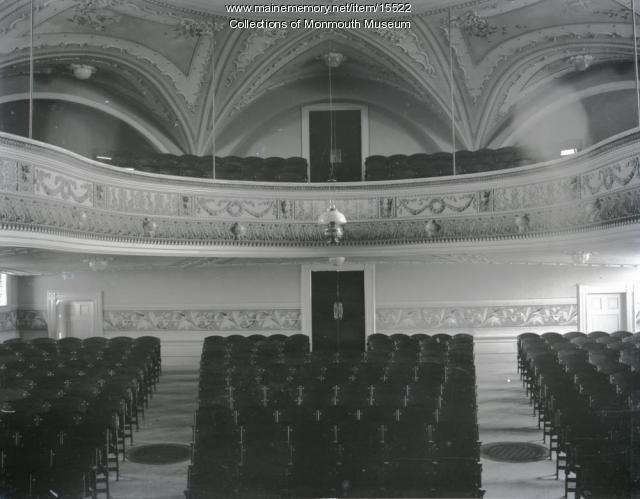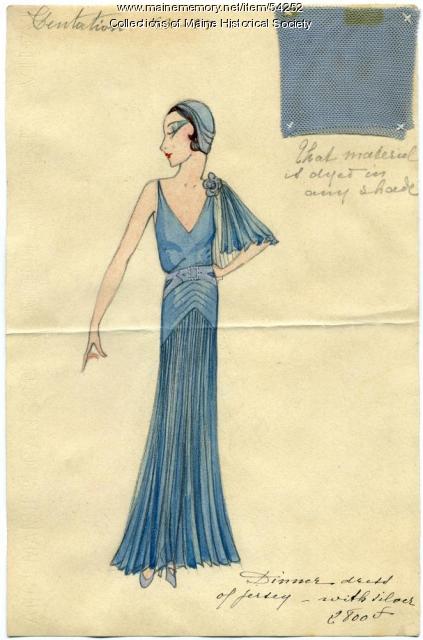Keywords: New building
- Historical Items (1100)
- Tax Records (26)
- Architecture & Landscape (27)
- Online Exhibits (155)
- Site Pages (464)
- My Maine Stories (34)
- Lesson Plans (1)
Online Exhibits
Your results include these online exhibits. You also can view all of the site's exhibits, view a timeline of selected events in Maine History, and learn how to create your own exhibit. See featured exhibits or create your own exhibit
Exhibit
From the last decades of the nineteenth century through about the 1920s, vacationers were attracted to large resort hotels that promised a break from the noise, crowds, and pressures of an ever-urbanizing country.
Exhibit
The Life and Legacy of the George Tate Family
Captain George Tate, mast agent for the King of England from 1751 to the Revolutionary War, and his descendants helped shape the development of Portland (first known as Falmouth) through activities such as commerce, shipping, and real estate.
Exhibit
Student Exhibit: The Great By-Pass
The debate over a proposed bridge and bypass in Skowhegan in 2005.
Exhibit
Rum, Riot, and Reform - Neal Dow
"… was taken after the Rum Riot of 1855, the building had changed little after city government had moved to an elegant new Hall."
Exhibit
Irish Immigrants in Nineteenth Century Maine
With the popularity of all things Irish in modern America, many people have forgotten the difficulties faced by nineteenth century Irish immigrants.
Exhibit
Elise Fellows White: World Traveling Violin Prodigy
Elise Fellows White was a violinist from Skowhegan who traveled all over the world to share her music.
Exhibit
Practical Nursing in Waterville
The Maine School of Practical Nursing opened a facility in Waterville in 1957 and continued teaching practical nursing there until about 1980 when changes in the profession and in the state's educational structure led to its demise.
Exhibit
Rum, Riot, and Reform - Taverns, People, and Scenes
"… legendary status by extinguishing her burning building during the British bombardment of 1775. She ran the tavern until her death in 1795."
Exhibit
Rum, Riot, and Reform - Bootleggers vs. Police
"Building such craft for bootleggers brought a brisk business to Downeast boatyards. Prohibition liquor hiding techniques: Victrola before…"
Exhibit
Music in Maine - Opera, Orchestras and Stages
"Nordica told the New York Herald: "Brunnhilde…is a most trying role...you must be so note perfect in that role that nothing can disconcert you."¬¬…"
Exhibit
Trolleys were the cleanest and most efficient means of mass transit Maine has ever known.
Exhibit
Cooks and Cookees: Lumber Camp Legends
Stories and tall tales abound concerning cooks and cookees -- important persons in any lumber camp, large or small.
Exhibit
Home: The Wadsworth-Longfellow House and Portland - The Privy
"In rural areas, when the pit became full, a new pit was dug, the outhouse moved, and the old pit was covered over."
Exhibit
Rum, Riot, and Reform - Temperance Membership
"… This parade banner was painted for the boat building professions of the Maine Charitable Mechanic Association."
Exhibit
Walter Wyman's vision to capture the power of Maine's rivers to produce electricity led to the formation of Central Maine Power Co. and to a struggle within the state over what should happen to the power produced by the state's natural resources.
Exhibit
Music in Maine - Community Music
"Rural communities in Maine used Grange buildings as community centers, hosting dances and concerts. Sometimes Grange halls served as town library and…"
Exhibit
A Portland newspaper wrote about an ice storm of January 28, 1886 saying, "The city of Portland was visited yesterday by the most inconvenient storm of the season."
Exhibit
Lt. Charles Bridges: Getting Ahead in the Army
Sgt. Charles Bridges of Co. B of the 2nd Maine Infantry was close to the end of his two years' enlistment in early 1863 when he took advantage of an opportunity for advancement by seeking and getting a commission as an officer in the 3rd Regiment U.S. Volunteers.
Exhibit
Cosmopolitan stylings of Mildred and Madeleine Burrage
Born in Portland, sisters Mildred Giddings Burrage (1890-1983) and Madeleine Burrage (1891-1976) were renowned artists and world travelers. Mildred's experiences studying painting in Paris and Italy, and the sisters' trips to Mexico and Guatemala inspired their artwork and shared passions for cosmopolitan and stylish attire. Housed at Maine Historical Society, The Burrage Papers include selections of original advertising drawings called "line sheets" from Parisian fashion houses dating from 1928 to 1936. Images of Madeleine's gemstone jewelry and Mildred's artwork accompany intimate family photographs of the sisters.
Exhibit
A City Awakes: Arts and Artisans of Early 19th Century Portland
Portland's growth from 1786 to 1860 spawned a unique social and cultural environment and fostered artistic opportunity and creative expression in a broad range of the arts, which flowered with the increasing wealth and opportunity in the city.
Exhibit
Christmas, a Christian holiday observed by many Mainers, has a very public, seasonal face that makes it visible to those of all beliefs.
Exhibit
In 1921, Guy Gannett purchased two competing Portland newspapers, merging them under the Portland Press Herald title. He followed in 1925 with the purchase the Portland Evening Express, which allowed him to combine two passions: photography and aviation.
Exhibit
The Establishment of the Troy Town Forest
Seavey Piper, a selectman, farmer, landowner, and leader of the Town of Troy in the 1920s through the early 1950s helped establish a town forest on abandoned farm land in Troy. The exhibit details his work over ten years.
Exhibit
Maine Eats: the food revolution starts here
From Maine's iconic lobsters, blueberries, potatoes, apples, and maple syrup, to local favorites like poutine, baked beans, red hot dogs, Italian sandwiches, and Whoopie Pies, Maine's identity and economy are inextricably linked to food. Sourcing food, preparing food, and eating food are all part of the heartbeat of Maine's culture and economy. Now, a food revolution is taking us back to our roots in Maine: to the traditional sources, preparation, and pleasures of eating food that have sustained Mainers for millennia.
























